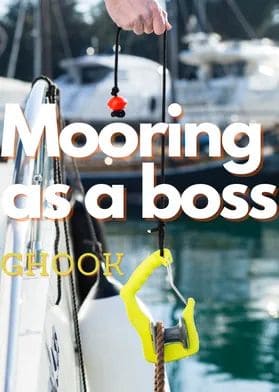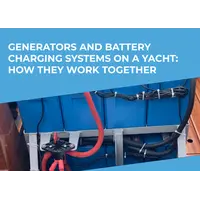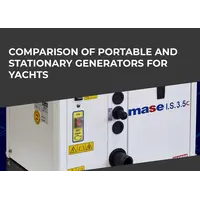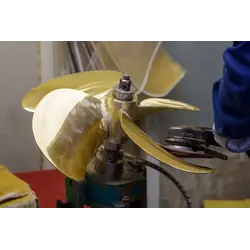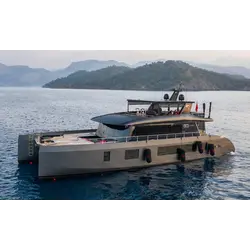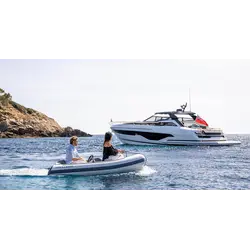In this article, based on our own experience at topRik, we’re going to tell you all you need to know when it comes to choosing a watermaker for your yacht. We had tested many watermakers in the past and couldn’t resist sharing our opinion: what is important when purchasing such a device and what doesn’t really matter. We talk about output, power, space and budge limitations, as well as testing, warranty and installation process. If that’s what you were looking for, let’s go!
At first, we need to define what a watermaker is, so we are on the same page. Marine watermakers for yachts are advanced systems that utilize various technologies to convert seawater into clean, drinkable water while removing the salt, minerals, and other dangerous elements present in seawater, leaving you with a refreshing supply of clean H2O.
[vitrina]1818,1687,1686,533,1820[/vitrina]
When it comes to best models of such devices, their secret sauce is a remarkable process called reverse osmosis. Inside the water maker, seawater is first filtered to remove larger particles and debris and then, it enters the reverse osmosis system, where it encounters the semipermeable membrane. This membrane has incredibly tiny pores that allow water molecules to pass through while blocking larger salt particles and impurities. It's like sifting the water to leave the salt behind!
As the seawater is forced against the membrane under high pressure, pure water molecules squeeze through, leaving the salt and impurities behind. This way, we get what we want – pure water on one side of the membrane and concentrated seawater, so-called brine, on another. Since we need only the former, brine is dumped back into the sea.
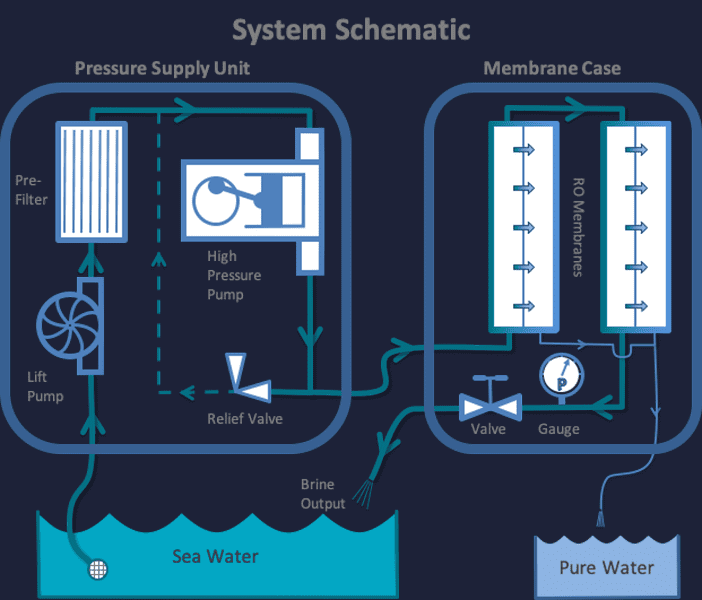
The RO systems, known for their efficiency and effectiveness, are like the elite troops of water makers. Distillation systems, are using a simpler method of boiling water and collecting the vapor. There are also UV systems - they use ultraviolet light to zap those pesky microorganisms lurking in the water.
That was our “Watermakers 101” – now moving on to the deciding factors of choosing one for yourself (we have other, much more technical articles about marine watermakers, if you want to know more).
Water Output Requirements
Figuring out the amount of water needed on your yacht is a first step in choosing the right water maker. Try to consider the number of people on board, the duration of your voyage, your water usage habits.
Calculate your water requirements for drinking, cooking, washing, showering - any activities that require water at all. It's always better to have more water than you think you'll need, accounting for some unexpected delays or emergencies.
Different types of marine water makers have varying output capacities. Reverse osmosis (RO) systems, for example, are known for their efficiency and can produce a higher volume of freshwater compared to other types.
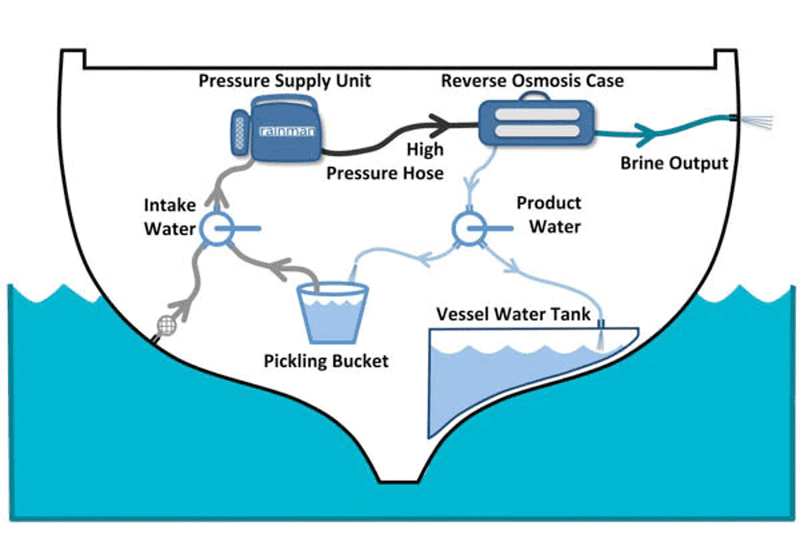
It important to optimize the output specifically to your needs: the device must ideally produce just the right amount of water, no more or less. If it doesn’t make enough, passengers will get angry, if it makes too more, you’ll have to stop the device occasionally - it leads to bacteria taking over the membranes, pumps and other parts of the mechanism. The water output is typically measured in liters per hour – this information comes from the manufacturer.
Don’t forget that there are other issues that can affect water output, such as seawater temperature and salinity level: higher temperatures and high amount of salt in particular water area could decrease the water output capacity of the system. Always plan your voyage accounting for such problems.
Power Source Availability
Now, let's talk about the power source for watermakers, as they don’t run on pure magic (maybe, a little).
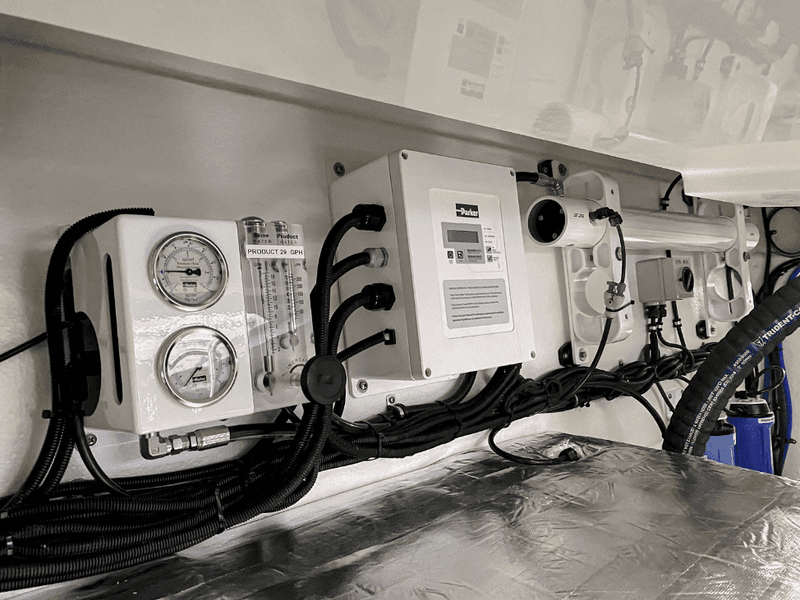
Keep in mind, that not all models will be compatible with your yacht’s systems. Here’s three most common ways to make it work:
- Electrical power - Many water makers can be powered by your yacht's electrical system. They are efficient and convenient, provided you have enough electrical capacity to support their operation. It's important to consider your yacht's electrical load and ensure that the water maker's power requirements align with your available power supply.
- Generator power - If your yacht has a generator, you can use it to power the water maker. Generators are commonly found on larger yachts and provide a reliable source of electricity. Make sure your generator has sufficient capacity to handle the water maker's power needs without overloading the system.
- Alternative power – starting from hand-cranked low output watermakers and finishing with solar panels or propellers, that charge from the water current. Today it becomes fashionable to include such options, especially on high-end yachts. Such sources help to reduce your dependance on diesel and also make this planet little bit less polluted.
Go through pros and cons of each option specifically on board your vessel and choose the one that best suits your yacht's setup and your environmental preferences.
Space and Weight Limitations
Ah, the eternal struggle of space and weight on a yacht - it's like playing a never-ending game of Tetris, trying to fit everything in just the right spot. When choosing a water maker, consider the available space for installation and decide whether you can fit a fixed model somewhere or you’ll need to opt for a modular option - such systems can be easily disassembled and installed in separate components, making them a flexible option for yachts with limited space and weight limitations.
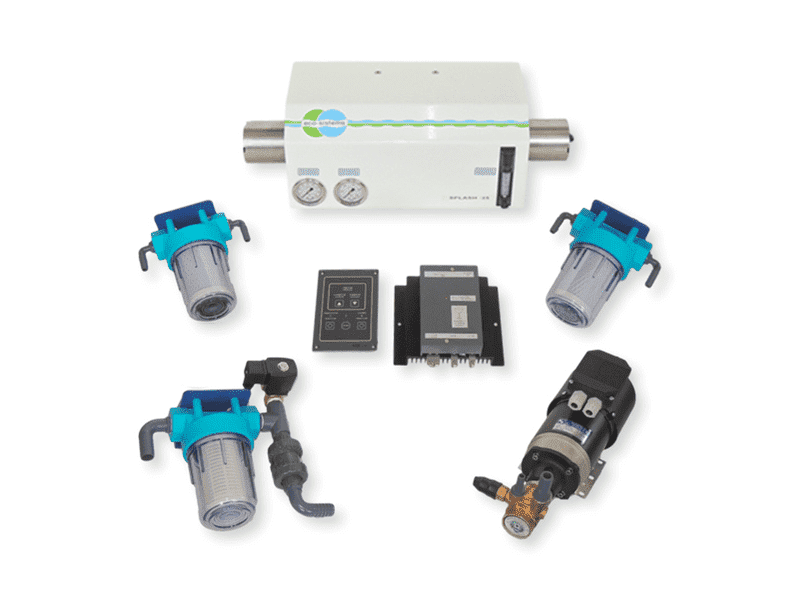
Yachts have limited space, and you don't want the water maker taking up precious real estate or hindering your ability to move comfortably around your vessel. That’s why at topRik marketplace we offer compact and space-efficient water maker models available to accommodate yachts of all sizes.
Weight limitations are another crucial factor to consider. Every yacht has a maximum weight capacity, just like your luggage on a budget airline. Ensure that the water maker you choose won't tip the scales and leave you scrambling to offload excess cargo. The key here is to find a marine water maker that fits snugly into your yacht's layout, without weighing you down. Go for lightweight water maker models on smaller boats to avoid moving like a snail on the water.
Budget Considerations
To sail in the waters of affordability, assess the trade-offs between cost and performance to find the sweet spot that aligns with your financial capabilities.
While RO systems, as we already mentioned, may be the top choice for many yacht owners, they do tend to be more expensive upfront compared to distillation or UV models. However, the long-term costs of maintenance and operation can often outweigh the initial investment - RO systems have lower energy consumption compared to distillation systems, making them more cost-efficient in the long run. Sometimes it is way too expensive to purchase many cheap things in a row.
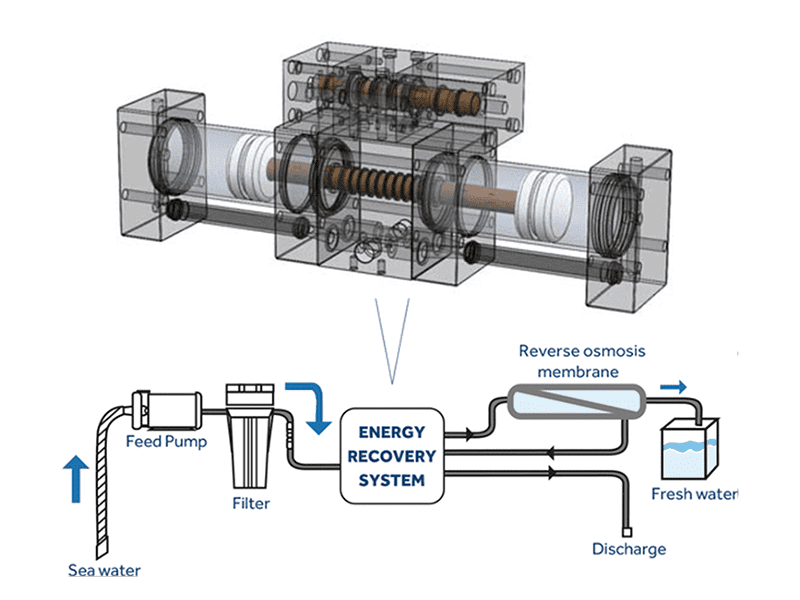
And yet, even the most expensive model will need an occasional filter replacement, cleaning the membranes and fixing the leaking tubes. These maintenance costs might vary depending on the brand and model of the system, that’s why it makes sense to research and compare possible repair requirements and take them into account. You can search the prices of some filter replacements or membrane conservatives in search for, let’s say, Water-Pro B-60 watermaker on our website and see if that’s alright with you to maintain such a machine on board.
Water Quality and Testing
You wouldn't want to gulp down water that tastes like a fisherman's boot, would you? Water quality refers to how pure and delicious your cup of water is. It's all about keeping those unwanted impurities, like bacteria, viruses, chemicals, and funky odors, far away from your taste buds.
But here's the issue - different marine watermakers have different water quality standards. Some watermakers go above and beyond to provide you with crystal-clear, ultra-purified water (up to 99%) and others might give you water that's just good enough. It's like the difference between sipping champagne on a luxury yacht or settling for a lukewarm soda on a dinghy. Of course, no manufacturer ever will market their product as “it’s tolerable” – they all will ensure you that their particular model does wonders. So, go on the internet and find some reviews on every single desalinator that has the right price tag and specifications.
Even if your friend recommends you a specific model, you need to make sure that your specific unit is fine. That's where testing kits come into play. Using one of these on a water sample is like putting your watermaker through a rigorous taste exam - just like a wine connoisseur swirls, sniffs, and sips before giving their seal of approval. By conducting regular tests, you can make sure your watermaker is working as intended.
Brand Reputation and Warranty
As you embark on your voyage to find the perfect marine water maker, don't forget to look out for pirates. Some companies with their shady practices might turn this experience into a nightmare - researching the brand and its reputation is akin to consulting your navigation charts before setting sail.
Look for customer feedback, ratings, and testimonials to get a sense of what other yachtsmen have experienced. Don't forget to consider the brand's longevity and track record in the marine industry. After testing their products, we can say that for established brands like Eco Sistems and Schenker, represented here, it will not profitable to scam you, since they already got a certain reputation – usually it’s the new kids on the block that might be into cutting corners. Look for brands known for their expertise in marine water makers and their commitment to quality.
In your exploration, unravel the mysteries of the warranty terms, try to look for comprehensive coverage and a company that actually stands by its product. Consider factors like warranty duration, coverage of parts and labor, customer support, check if there are any limitations or exclusions. Longer warranties often indicate the brand's confidence in their product's durability and performance.
Installation and Maintenance Requirements
We've all had those moments where we purchase a new device, successfully break it, and then spend hours with the user manual that might as well be written in a foreign language. Don’t think that all watermakers work right out of the box - some systems require professional installation, while others are more DIY-friendly.
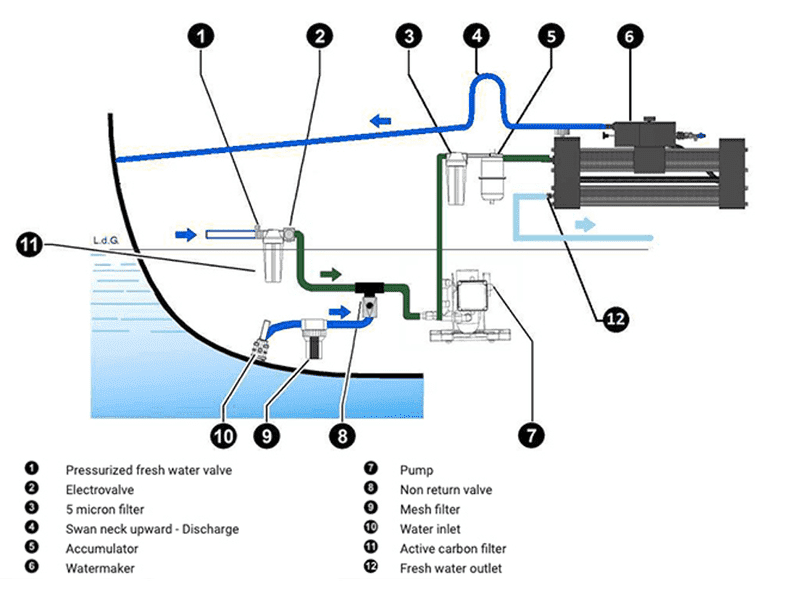
The complexity of installation can vary depending on the specific model and your yacht's layout. Some systems may require minor modifications or additional plumbing work, while others can be easily integrated into your existing water system without breaking a sweat. Consider your DIY skills, the available space, and your comfort level with tinkering - only choose a watermaker that matches your installation capabilities. If you don’t care about its inner workings and want to just hire a professional to install it, make sure that you at least know the basics in case it breaks during a voyage. Many watermakers on the market today come with user-friendly installation guides that make the process as smooth as sailing on calm waters. They provide step-by-step instructions, diagrams, and sometimes even handy videos to guide you through the setup.
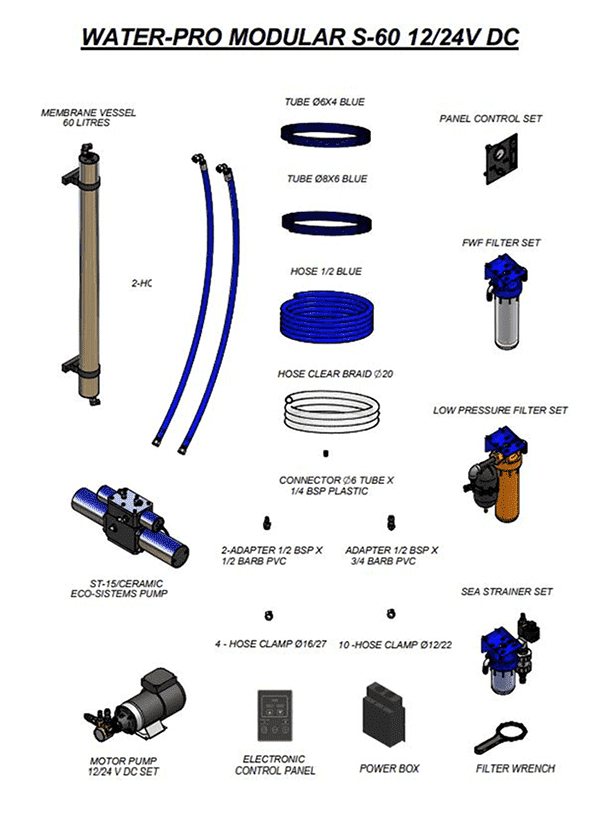
The maintenance is itself an ongoing voyage. Regular maintenance requirements can include filter changes, flushing the system and always - periodic cleaning. Make sure to choose a water maker that fits your technical know-how and time availability or delegate it to tech savvy crewmen. Even the best model on the market will deteriorate very quickly without constant care.
Conclusion
When choosing such an important and complicated system, it is easy to either get careless and end up making a mistake, or succumb to overanalyzing and stay afraid of purchasing anything at all. Getting the right model requires certain information, which comes with experience.
The experts of our marketplace are always eager to share what they know about water makers – just send us a message regarding a model that you saw on the website, make sure to describe your specific situation and requirements. We will help you understand whether that’s the right model for your vessel, whether it provides the right output, if it’s compatible with your circuit, does it come with spare parts etc. It is always easier when you rely on somebody who did it before.
Keep in mind all these factors that we mentioned – remember, it's all about finding that sweet spot of functionality, convenience and efficiency.

